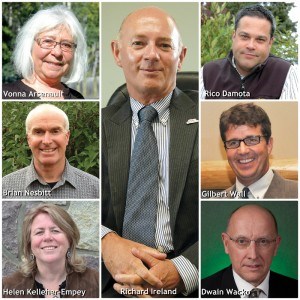
Compensation rates for Jasper’s elected officials, the role of Jasper’s mayor and electoral reform were all up for debate during a committee-of-the-whole meeting, Feb. 28.
Remuneration for elected officials
The wages and benefits collected by Jasper’s elected officials are generally in line with other municipalities, according to an independent review of the town’s compensation policy.
The report compared data from 15 comparable communities and found compensation rates only need minor changes to be consistent with other towns in Alberta and British Columbia.
The most significant recommendation was increasing per diem rates for the mayor and councillors from $186.63 to $240, effective immediately after the 2017 municipal election in October.
The report also recommended changing meeting rates outside of regular council duties.
Currently councillors are paid $186.63 per meeting, regardless of how long the meeting runs.
The report recommended paying elected officials $120 for meetings that are three hours or less and paying them $200 for meetings that are three to six hours in length.
If the pay structure is changed, Mayor Richard Ireland suggested the policy should include limitations in terms of how many meetings an elected official can claim per day before he or she should be paid at the per diem rate.
For example, he suggested an elected official shouldn’t be able to claim he or she attended four, one-hour meetings, in a single day and charge tax payers $480 instead of the $240 per diem rate.
Bernie Kreiner, former CAO for Hinton who wrote the report, agreed with the mayor, adding that this would help ensure elected officials follow the spirit of the policy.
Currently the mayor earns approximately $2,600 as an honorarium per month (gross) while councillors are paid approximately $1,000 per month. This includes regular duties such as attending council meetings, events and other regular meetings with organizations such as Parks Canada or ATCO.
According to the report, the municipality offers a healthy benefits package and its expense rates to cover mileage, meals and hotels, are also in line with other municipalities.
During the discussion the mayor also asked whether the compensation package offered to elected officials would limit the type of people who are able to run for office.
“The attractiveness to run shouldn’t just be based on financial matters,” said Kreiner.
“Hopefully we’ll find that people that run for council are interested in government and serving the community as well as compensation.”
The issue will come back before council during a committee-of-the-whole meeting on March 14.
Full-time or part-time mayor?
As part of his review, Kreiner also looked at whether it was time Jasper had a full-time mayor and concluded that given the size of Jasper and the time requirements of the role moving to a full-time mayor would not be appropriate.
He did however, recommend providing the mayor with administrative support to help the mayor prepare for meetings and make the role more attractive to other candidates.
According to his report, Mayor Richard Ireland spends about 20 hours a week carrying out his duties, including doing all of his own research because there is no administrative support offered by the municipality and it’s his preferred style.
“I would dare say that’s probably an underestimate,” Kreiner said, about the number of hours the mayor spends on a weekly basis preparing for presentations and meetings.
Mayor Ireland said he appreciated the idea, but suggested the administrative support should extend beyond the mayor to all councillors.
“I think that all of council could be more effective if resourced slightly differently,” said Ireland.
According to the report, most municipalities provide some form of administrative support to the mayor’s office, usually from the same individual that takes minutes at council meetings and support’s the CAO and other senior managers.
In Jasper, administration recently restructured its legislative services, which now includes a legislative services manager and a legislative services coordinator.
Appointed or elected mayor?
During the meeting, Mark Fercho, the town’s chief administrative officer, sought council’s direction on whether Jasper’s mayor should be elected by voters or if councillors should appoint the mayor during the next municipal election on Oct. 16.
The general consensus among councillors was to keep the current electoral system the way it is, giving electors the opportunity to directly vote for the mayor and councillors.
“Over the years talking to different people in the community I think the residents of Jasper like to elect their own mayor,” said Coun. Helen Kelleher-Empey.
Mayor Ireland said he saw the pros and cons of each system, but agreed that the current system should remain in place.
“Annually the elected group endorses its leader, which means that the mayor is never going to be without the support of the council and I think that it makes for a more unified, productive approach. With that said, it is not a system that is common and most people are not comfortable with it. They like the idea of electing a mayor,” said Ireland.
“With all of that said, I would remain with the system that we have even though I see some strong benefits with the other system.”
Councillors suggested the question could be added to the election ballot during the next municipal election or during the next residential satisfaction survey.
Paul Clarke
[email protected]
